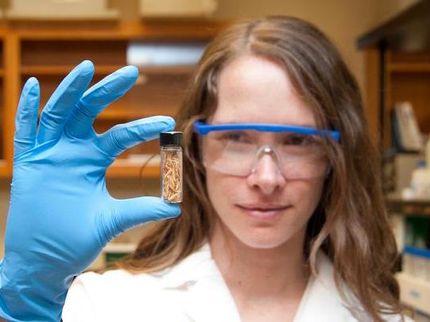FIU scientists discover how arsenic builds up in plant seeds
Advertisement
Researchers from FIU's Herbert Wertheim College of Medicine Barry P. Rosen and Jian Chen, both from the Department of Cellular Biology and Pharmacology, are part of an international team that has identified how arsenic gets into the seeds of plants such as rice. The discovery holds the promise of healthier rice grains.

This image shows an Arabidopsis plant overlaying rice grains that spell out arsenic because this research predicts that this is how arsenic gets into the rice grains that we eat.
Gui-Lan Duan and Barry P. Rosen
"While the process of how arsenic is taken into roots and shoots of plants is fairly well understood, little is known about how arsenic gets into seeds," says Rosen. "Understanding how arsenic is accumulated in seeds such as the rice grain is of critical importance in population health."
The group of scientists discovered that Arabidopsis thaliana, which is used as a model for food plants such as rice, uses transport systems for inositol (a type of sugar) to load arsenite (the toxic form of arsenic) into seeds, making their work the first identification of transporters responsible for arsenic accumulation in seeds.
Arsenic is a toxin and a carcinogen that comes from minerals and is used in some herbicides, animal growth promoters, and semiconductors. The U.S. Environmental Protection Agency (EPA) ranks arsenic first on the U.S. Priority List of Hazardous Substances. The EPA asserts that it pervades our drinking water, and the U.S. Food and Drug Administration is concerned about arsenic endangering the safety of our food supply.
A major source of dietary arsenic are plants such as rice that have accumulated arsenic. And rice is a major component of the diet of more than 2.5 billion people worldwide. The average American eats 25 pounds of rice per year, according to the U.S. Rice Producers Association.
Rosen, who specializes in arsenic research, said discoveries such as this will enable the development of new rice cultivation methods with less arsenic in the grain.





























































